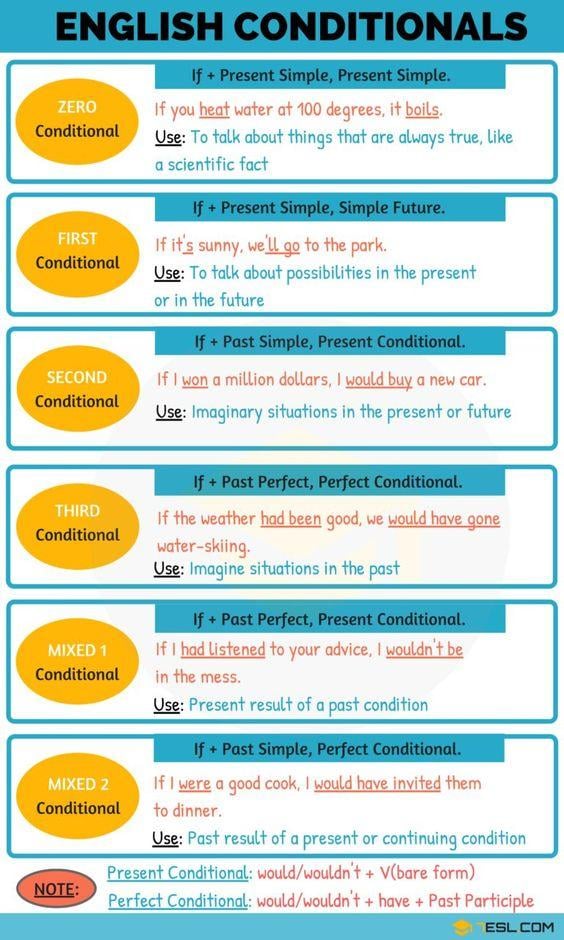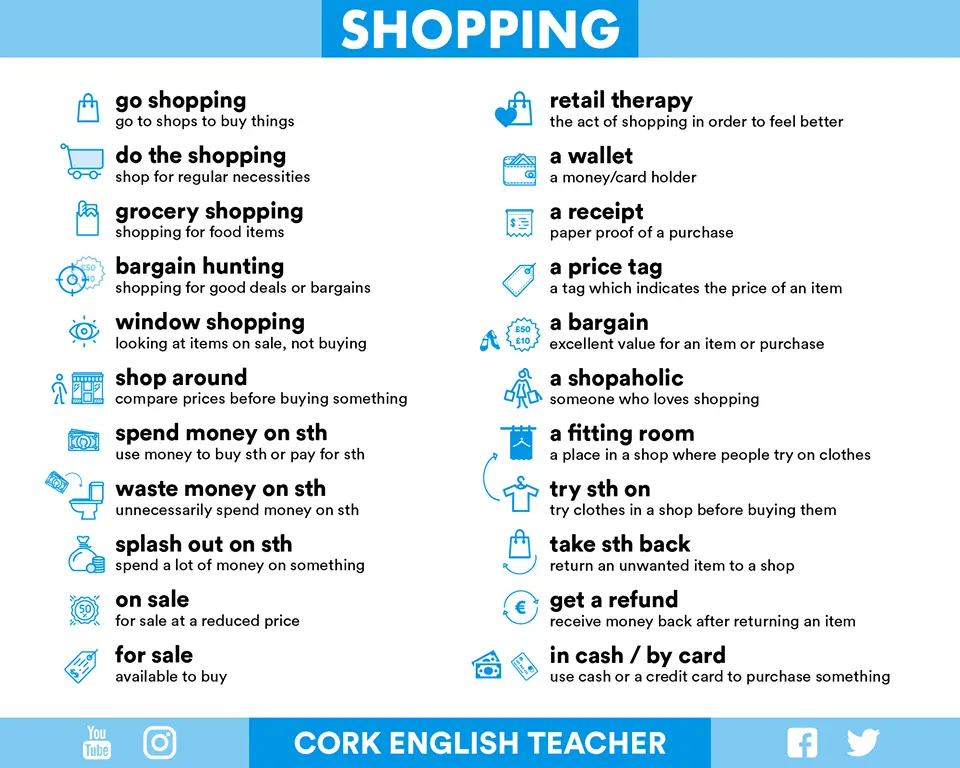European Parliament Ambassador School
Tuesday 22 December 2020
XMAS-Special edition lockdown.
Video Info: What do you know about Xmas?
List of Christmas Words
Christmas Project
Song: Jingle Bell Rock
Song: All I want for Christmas is you
Song: Christmas is all around
Top Ten Christmas songs
Quizzes, Word Searchers, Puzzels, Crosswords, Printables, etc.
Online Christmas Questionnaire
Christmas Questionnaire (before X-mas)
Christmas Questionnaire (after X-mas)
After Christmas Activity
Short Christmas Questionnaire
Christmas Story Quiz
Christmas Conversation Cards
Christmas Traditions Quiz
Quia - Quiz - Upgrade of Java Quiz: Advent
Christmas In Denmark (ESL Quiz)
ESL Christmas Crossword
Word Search - Christmas
Christmas Scavenger Hunts
ESL Christmas Dinner Crossword
Printable Christmas Puzzle
Christmas Word Puzzle
Fun Things that you can do for Christmas
Christmas activities
Stories & Traditions of Christmas
Religious Celebrations BBC Schools
How did Christmas start? How does the West celebrate Christmas?
Holiday Stories and Traditions
Christmas celebrations around the world
Customs and Traditions in England Woodlands Junior School Kent uk
Christmas In UK (By students at Hugo Meynell School)
e-mail Santa
E. L. Easton - English - Christmas Links
Christmas Stickers
Sunday 20 December 2020
Xmas Holiday homework: Reading and Listening and research (section 1 Europe Activity Book)
Hope you can enjoy some free time and practise English as much as possible. Here, you will find some reading suggestions which I hope you can enjoy on your own.
Forrest Gump. John Escott
It would be a very difficult case to find at least one person on Earth, who did not know the famous film "Forrest Gump" with Tom Hanks. Certainly, everybody knows and loves this movie. But have you ever read the book on which this film is based? There is a very common situation, when the book is better than the movie. Is this the same case? Let us revise our memories and read a short plot of this story. "This is a true, wonderful and funny story about Forrest Gump. Forrest is a young kind-hearted man from Alabama in the USA. He has won a medal for gallantry in the Vietnam war. The President Of the United States awarded the hero. Forrest was a footballer, a businessman and a film star. He also went in space. His best friend was an ape called Sue."
Click on the link to download files or audio:
https://english-e-reader.net/book/forrest-gump-john-escott
https://english-e-reader.net/book/forrest-gump-john-escott
Saturday 19 December 2020
Tuesday 15 December 2020
Coronavirus impact
Nearly 10% of the Spanish population may have contracted the coronavirus at some point, half of them during the second wave of the pandemic, according to the preliminary results of the fourth wave of a seroprevalence study released on Tuesday.
Results indicate that 9.9% of Spain’s 47 million residents have developed antibodies after exposure to the virus, said the head of the Carlos III Health Institute, Raquel Yotti. The first wave of the study, in May, showed that 5% of the population had developed antibodies; in July that figure had risen slightly to 5.2%.
The director of the National Epidemiology Center, Marina Pollán, noted that during the first wave of the coronavirus in Spain, only one out of every 10 cases were being detected. “Right now, in this second wave of the epidemic, we might be detecting around 60%.”
The study was done between November 16 and 29 at 1,500 healthcare centers, with 51,709 participants, 63% of those who took part in earlier rounds.The Spanish government is asking citizens not to let their guard down, as the latest data suggests that the recent downward trend in coronavirus infections may have come to an end. The country on Monday reported the first rise in weekend cases in five weeks, and experts have warned that Spain is going into the Christmas holidays with a higher incidence rate than it had at the beginning of summer.
Friday 11 December 2020
Listening
Lable the map below.
Write the correct letter, A-E, next to questions 11-15.
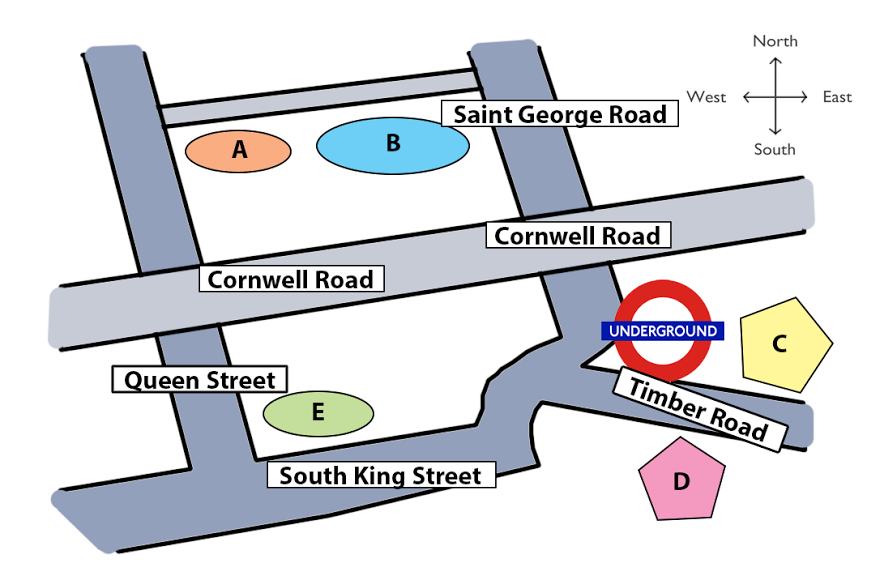
11. Science Museum
12. National History Museum
13. Car Park
14. Shopping Mall
15. Primary School
Questions 16-20
What is the improvement of each main point of interest in the area?
Choose FIVE answers from the box and write the correct letter, A-G, next to questions 16-20.
A New entrance
B Free lunch provided
C Free information provided
D Increase in size
E Additional signs
F New exhibitions
G New structure
16. Car park _______
17. Primary School
18. Science Museum
19. National History Museum
20. Shopping Mall
CONDITIONALS IN SONGS
Wednesday 9 December 2020
Monday 7 December 2020
Games: Speaking practice: NEVER HAVE I EVER
Speaking practice:
School Days
- Never have I ever been sent to the principle's office.
- Never have I ever copied from someone else's paper.
- Never have I ever used the excuse, "My dog ate my homework."
- Never have I ever fallen asleep in class.
- Never have I ever written my parent's signature on something.
- Never have I ever written a note to someone I liked.
- Never have I ever tried to change a grade on a report card.
- Never have I ever gotten into a fight at school.
- Never have I ever lied to a teacher.
- Never have I ever cheated on a test.
- Never have I ever skipped class.
- Never have I ever been a teacher's pet.
Funny Facts
- Never have I ever played video games for more than 2 hours in a day.
- Never have I ever stuck my finger in a birthday cake.
- Never have I ever eaten cold pizza.
- Never have I ever tried cutting my own hair.
- Never have I ever eaten raw cookie/cake dough.
- Never have I ever had sushi.
- Never have I ever accidentally put clothes on backwards and not noticed.
- Never have I ever accidentally worn shoes on the wrong feet without noticing.
- Never have I ever made a prank phone call.
- Never have I ever spun around so much that I threw up.
Family Life
- Never have I ever lied about doing my chores.
- Never have I ever put stuff under my bed or in my closet and pretended I cleaned my room.
- Never have I ever fed the dog under the table.
- Never have I ever been embarrassed by my parents.
- Never have I ever played a prank on my brother or sister while they were sleeping.
- Never have I ever watched something on TV that I knew I wasn't allowed to.
- Never have I ever hid something under my mattress.
- Never have I ever paid my brother or sister to do my chores for me.
- Never have I ever stayed up all night.
- Never have I ever found Christmas presents before Christmas.
- Never have I ever eavesdropped on my parents arguments.
- Never have I ever gone to bed without brushing my teeth.
- Never have I ever gotten something I didn't want for Christmas, but pretended to be happy.
- Never have I ever drew a mustache on my brother or sister while they slept.
- Never have I ever slept in til after noon during summer break.
- Never have I ever locked myself out/left the keys of the house on accident
That's Gross!
- Never have I ever picked my nose and ate it.
- Never have I ever ate food that had fallen on the floor.
- Never have I ever used someone else's toothbrush.
- Never have I ever thrown up on someone.
- Never have I ever wet the bed at someone else's house.
- Never have I ever taken things from a trash can.
- Never have I ever walked in on someone in the bathroom.
- Never have I ever licked someone's food.
- Never have I ever dropped my phone in the toilet.
- Never have I ever eaten something that was expired.
- Never have I ever eaten a bug.
- Never have I ever farted in the car/elevator.
- Never have I ever spit in someone's drink.
- Never have I ever touched a worm.
- Never have I ever let a dog lick my face.
- Never have I ever found someone else's hair in my food and continued eating.
Thursday 3 December 2020
ARGUMENTATIVE WRITING: Advantages -Disadvantages
There has been a dramatic change in the lifestyle of people over the years. The availability of readymade food has made it easy to maintain this modern lifestyle. While there are some clear benefits to this situation, I personally believe that the drawbacks are more significant.
The main advantage of the convenience food is that it saves the time which is spent in cooking food. As a result, people can utilize this time for other purposes such as relaxing and doing other recreational activities. Moreover, the productivity of work has increased. For instance, there are many food stalls available at the workplace; thus one finds it convenient to have lunch with so many options to choose. Also, one does not have to wake up early to cook food.
On the other hand, there are many disadvantages associated with readymade food. For example, it may be unhealthy and unhygienic. Firstly, it does not provide complete nutrition and contains preservatives which are harmful if consumed in excess quantity. For instance, studies have linked the rise in cancer cases to the high content of preservatives in the packed food. In addition, the standards of hygiene are not maintained in many food stalls. This can lead to the spreading of diseases such as typhoid and cholera and reduce the productivity of people.
To conclude, time saving is the main advantage of the availability of convenience food; however, in my opinion, the disadvantages of regular consumption of readymade food outweigh the advantages. From my point of view, people should give up their dependence on packaged food and consume more homemade food.
https://adilblogger.com/advantages-disadvantages-mobile/
Monday 30 November 2020
In the press- Coronavirus and expectations for Xmas
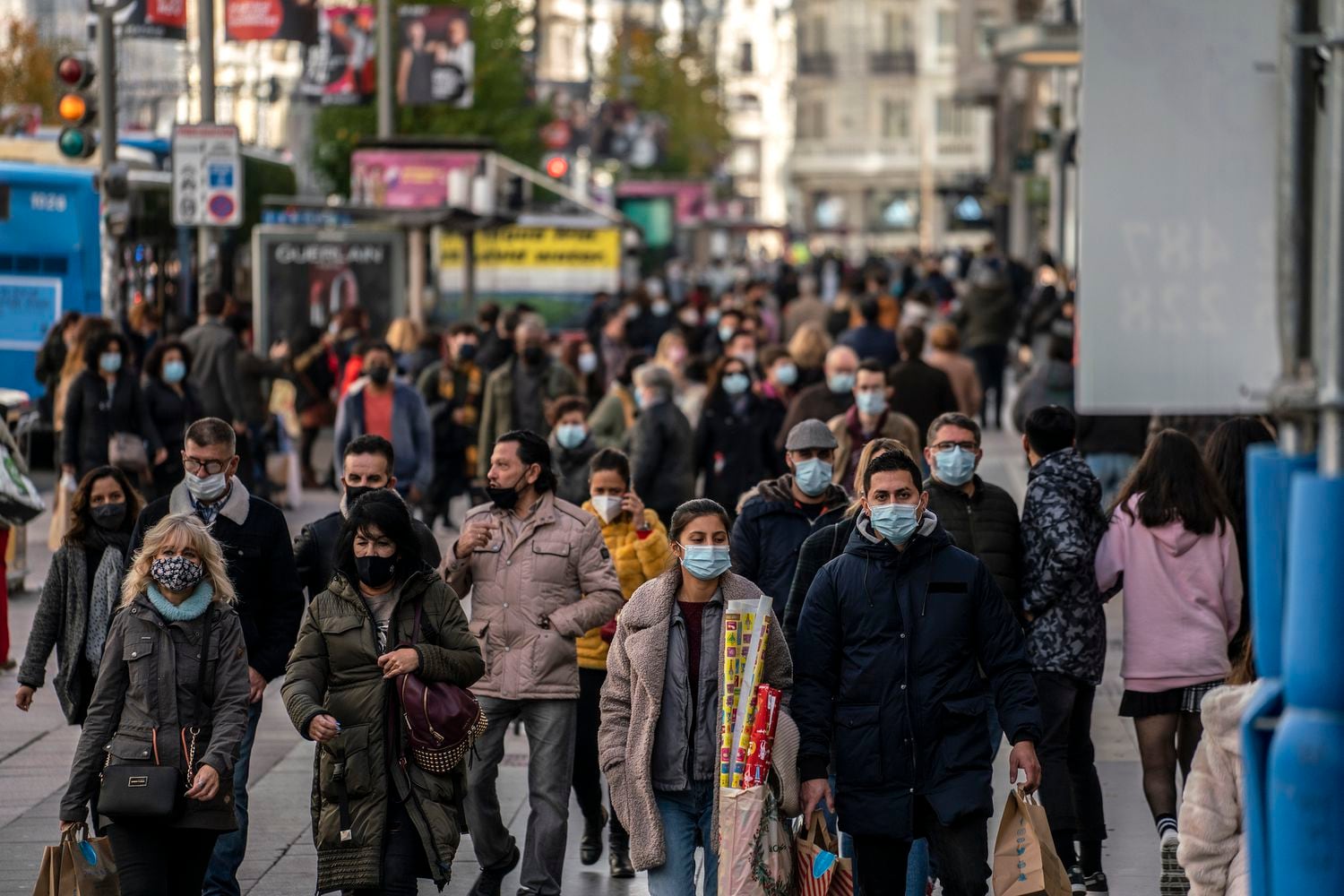
Spain’s health secretary of state, Silvia Calzón, called on the public on Monday to show “responsibility and prudence” after crowds flooded the streets at the weekend to go Christmas shopping and see the traditional festive lights go on. The packed scenes – seen in several cities, including Madrid, Barcelona, Valencia and Málaga – prompted Calzón to recommend that citizens “avoid crowds” in the lead-up to Christmas to avoid worsening the coronavirus situation in Spain. “This is not over,” she warned.
“We would like to make a call for responsibility and prudence,” said Calzón in a radio interview with Spanish station Canal Sur on Monday “It has taken a lot of work and sacrifice to flatten the curve.” The incidence rate of the coronavirus has been steadily falling across Spain, but health authorities warn it still remains at “very high” levels. Although the sharp rise in new cases seen after the summer holidays may have eased, experts warn that increased social gatherings and travel over the festive season could lead to a new spike in infections.
“We cannot forget how badly many families have suffered,” or the impact the virus has had “on the most vulnerable,” said Calzón. “If we like Christmas, let’s ensure that we are all here for next Christmas,” she added, arguing “it’s worth the sacrifice.”
The health official also called on citizens to use “common sense.” She recommended that the public hold gatherings outdoors and avoid crowds to limit the risk of possible contagion. Calzón said the Christmas period was “an especially dear time” but would be “special” this year in a bid to reduce contagions. “We have to focus on protecting those we most love,” she said. “Perhaps we have to sacrifice our way of socializing with lots of people from lots of different areas in order to enjoy more and protect more those we love, especially elderly people.”
With the festive season approaching, the Spanish Health Ministry has proposed a series of measures aimed at preventing the spread of the virus, namely limiting social gatherings to 10 people and setting a 1am curfew for Christmas Eve and New Year’s Eve. But the final decision on what rules will be in place will fall to the regions. Calzón defended this position on Monday, arguing that regional governments “need to have the necessary autonomy” to set restrictions and adapt them to their “different epidemiological situations.”
Calzón said a group was working on designing “basic measures” that could be applied across Spain, adding that this plan would likely be discussed on Wednesday at the next meeting of the Inter-Territorial Council of the National Health System, which brings together central and regional health chiefs. The raft of measures is aimed at “sending a unified message to the public,” said Calzón, who admitted the restrictions are unlikely to be exactly the same in each region given the differences between each territory.
Sunday 29 November 2020
Vocabulary- Word formation
https://www.liveworksheets.com/ku1073225ps
https://www.liveworksheets.com/yb786388de
https://es.slideshare.net/challengeeducation/noun-suffixeshttps://www.slideshare.net/LynLenMercado/structure-of-englishaffixes1
Wednesday 25 November 2020
Tuesday 24 November 2020
Photography Contest- Human Rights
ADD YOUR PICTURE AND YOUR DESCRIPTION
Human Rights Photo Contest.
European Parliament Ambassadors Schools
Monday 23 November 2020
Conditionals-Exercises and Worksheets
REVISION:
MODALS:
https://www.english-grammar.at/online_exercises/modal-verbs/m009.htm
https://www.perfect-english-grammar.com/could-have-should-have-would-have-exercise-1.html
Worksheets - Web practice
- Conditional Clauses 6
- Conditional Clauses 7
- Conditional Clauses 8
- https://www.englishpage.com/conditional/conditionalintro.html
- https://www.englisch-hilfen.de/en/exercises_list/if.htm
- https://agendaweb.org/verbs/conditional-mixed-advanced-exercises.html
- https://www.perfect-english-grammar.com/conditional-exercises.html
First conditional - worksheet
First conditional - pdf exercises
Worksheet - first conditional
First conditional - download
Second conditional - worksheet
Conditional sentences - second
Second conditional - download
Worksheet - second conditional
Third conditionals - pdf exercises
The third conditional - pdf
Third conditional - pdf handout
Third conditional - pdf exercises
Zero / first / second / third
Conditional worksheet -> answers
Mixed conditionals - worksheet
Printables / worksheets
Conditional sentences - exercises
Conditionals - pdf exercises
If / unless - worksheet
If clauses - advanced 1
If clauses - advanced 2
If Clauses - all types 3
If Clauses - all types 4
If Clauses - all types 5
If Clauses - all types 7
If Clauses - all types 8
If clauses - worksheet
Worksheets pdf - print
If clauses - finish the sentences
Grammar worksheets - handouts
Conditional sentences - grammar
Sunday 22 November 2020
Thanksgiving- American traditions
Thanksgiving is a very American holiday. It is also ____________ Thanksgiving Day. It is celebrated on the fourth Thursday in November every year. It ____________ to be a religious holiday to give thanks to God. There are two ____________ of the origins of this holiday. One is thanks for the ____________ settlers arriving in America ____________. On December the 4th, 1619, a group of English pioneers arrived at a place called Berkeley Hundred, in Virginia. The group made a ____________ that the day of their arrival should be a "day of thanksgiving" to God. The second version is the thanks given to Native Americans for teaching the pilgrims how to ____________ eels and grow ____________ in Plymouth, Massachusetts. In 1941, President Roosevelt made Thanksgiving a federal holiday.
The main ____________ of any Thanksgiving is the Thanksgiving dinner. It is traditional to have baked or roasted turkey. This is ____________ accompanied with mashed potatoes, sweet potatoes, fall vegetables, cranberry sauce, and gravy. Pumpkin pie is the most ____________ eaten dessert. The Thanksgiving holiday weekend is one of the ____________ times of the year for traveling. It is a four-day or five-day weekend ____________ for most schools and colleges, and many businesses and government workers get three or four days off. Thanksgiving is also the unofficial ____________ for Christmas preparations to begin. Once Thanksgiving ____________, stores fill their ____________ with Christmas goods. It is also a bad time to be a turkey.
FLIPPED LESSON. COMPREHENSION:
Black Friday and Cyber Monday-Frenzy shopping
Idioms
- bargain hunting
- If you spend time in the shops looking for items to buy at the lowest price, you go bargain hunting.
"During the sales I go bargain hunting with my friends!"
- If you spend time in the shops looking for items to buy at the lowest price, you go bargain hunting.
- it's a bargain
- Said when an article is well below the usual price.
"That handbag goes beautifully with the dress, and at that price it's a bargain!"
- Said when an article is well below the usual price.
- I can't afford it
- If you can't afford something you don't have enough money to buy it.
"I'd love that jacket but I can't afford it!"
- If you can't afford something you don't have enough money to buy it.
- it costs an arm and a leg
- If an article or service costs an arm and a leg, it is very expensive indeed.
"The diamond engagement ring cost an arm and a leg!"
- If an article or service costs an arm and a leg, it is very expensive indeed.
- it costs a fortune
- Something that costs a fortune is very expensive.
"Look at the price of that bag - it costs a fortune!"
- Something that costs a fortune is very expensive.
- it's a steal
- The expression 'it's a steal'' means that something is so cheap that it’s almost as if you haven't paid anything for it.
"At that price it's a steal. You won't find it cheaper in any other shop."
- The expression 'it's a steal'' means that something is so cheap that it’s almost as if you haven't paid anything for it.
- it's good value for money
- Something that is good value for money is worth the money spent on it.
"The quality is excellent so it's good value for money."
- Something that is good value for money is worth the money spent on it.
- it's a bit pricey
- The expression a bit pricey means that something is a bit expensive.
"Their clothes are a bit pricey but they have a wonderful selection"
- The expression a bit pricey means that something is a bit expensive.
- it's a rip-off
- Something that costs much more than it should is called a rip-off.
"$10 for an orange juice? That's a rip-off!"
- Something that costs much more than it should is called a rip-off.
- shop around
- If you shop around, you visit a number of shops selling similar articles in order to compare the prices.
"You can usually save money by shopping around."
- If you shop around, you visit a number of shops selling similar articles in order to compare the prices.
- shop till you drop
- If you shop till you drop, you go shopping for a very long time, until you are exhausted.
"If you go to London with Ashley, you'll shop till you drop, so take comfortable shoes!"
- If you shop till you drop, you go shopping for a very long time, until you are exhausted.
- shopping spree
- If you go on a shopping spree, you enjoy a lively outing, usually with much spending of money.
"Liza is planning to go on a shopping spree as soon as she gets her bonus."
- If you go on a shopping spree, you enjoy a lively outing, usually with much spending of money.
- shopping therapy
- The term shopping therapy refers to the idea that buying things can make you feel better.
"A little shopping therapy can usually cheer up bored teenagers."
- The term shopping therapy refers to the idea that buying things can make you feel better.
- splash out
- If you splash out on something, you buy it even though it costs a lot of money.
"When he got a promotion Andy splashed out on a brand new car."
- If you splash out on something, you buy it even though it costs a lot of money.
- window shopping
- When people go window shopping, they look at things in shop windows, without actually purchasing anything.
"I haven't been paid yet, so I can only go window shopping."
- When people go window shopping, they look at things in shop windows, without actually purchasing anything.
BUY NOTHING DAY

- 1. Black Friday first became popular as a shopping day because
- 2. Why do some people think Black Friday is out of control?
- 3. To celebrate Buy Nothing Day, the rules are that you
- 4. According to the text, what should an ethical consumer probably not buy?


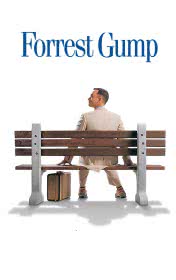
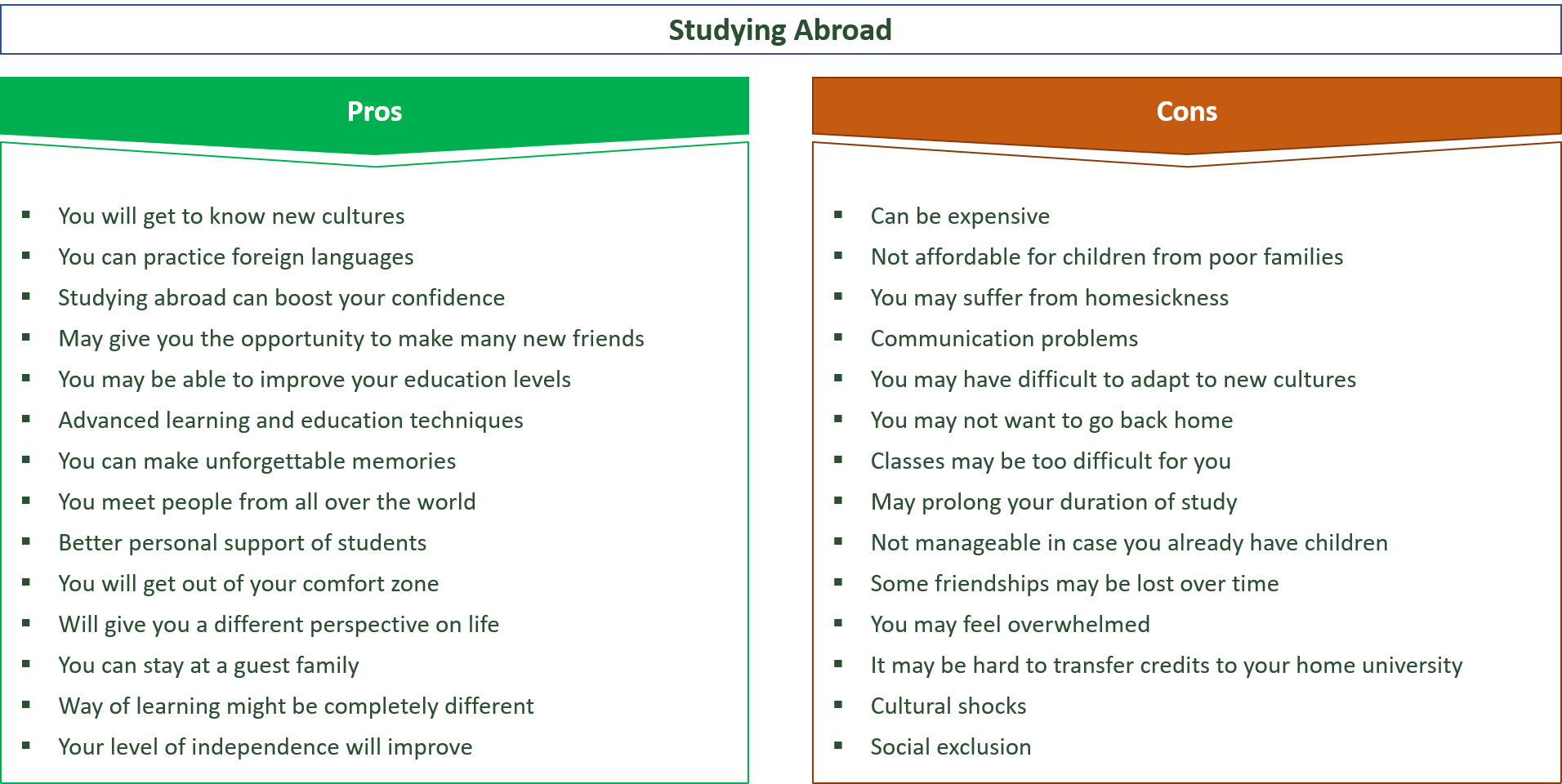

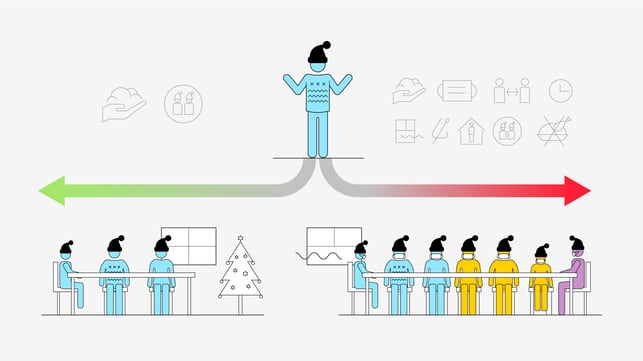

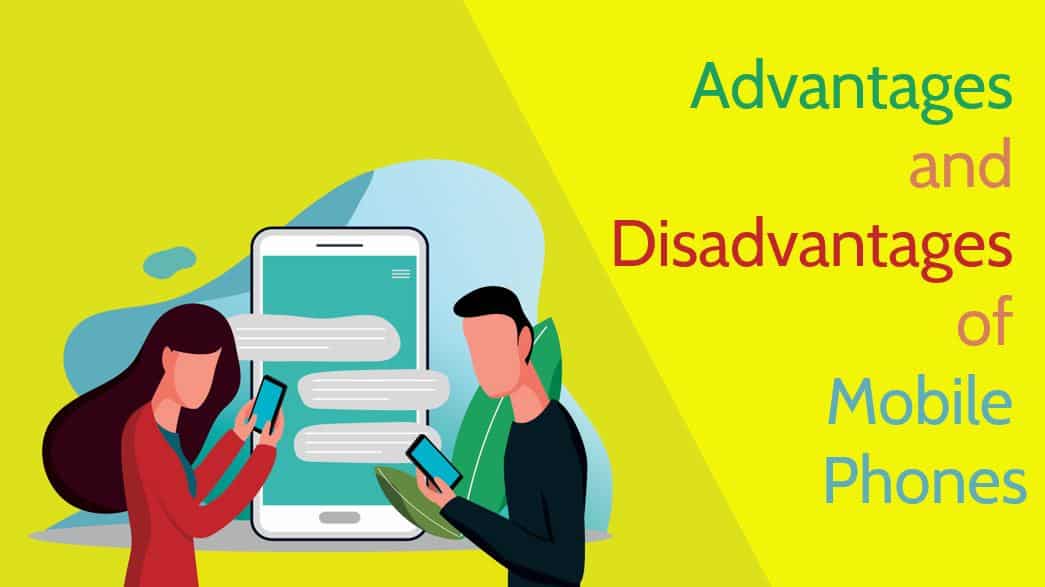



:strip_icc():format(webp)/sample-letter-format-2063479-Final-dc968bbbf3ee4716a4a3875763fd4b09.png)


